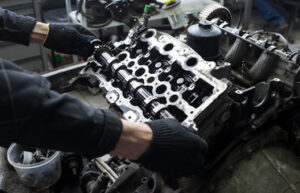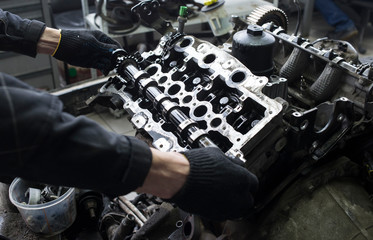Diesel mechanics specialize in the repair and maintenance of trucks and other vehicles. They must have a good understanding of the complexity of truck systems and equipment.
Commercial fleet operators use diesel mechanics to repair their trucks and other vehicles. These clients have diverse needs and demand a high level of service. Keep reading the article below to learn more about Diesel Engine Repair.
For diesel mechanics interested in advancing their careers, obtaining ASE certification is an excellent way to distinguish themselves from other job candidates. This credential, issued by the National Institute for Automotive Service Excellence, sets a minimum standard of competence and professionalism for all auto technicians. In addition to demonstrating their knowledge of automotive systems, ASE-certified mechanics are better equipped to solve problems, resulting in higher customer satisfaction.
The ASE offers several test series, each with a different exam focus. The ASE T2 Diesel Engines exam, for example, covers the maintenance and repair of diesel engines used in medium and heavy trucks and tractors. Each ASE exam contains a number of questions, from 40 to 80. Each question is written by a subject matter expert, who reviews the job tasks that must be performed to succeed in a specific job category and writes questions that reflect those tasks. The exams are administered at more than 400 local testing centers across the United States. Once a mechanic passes a test, they receive their results instantly.
Obtaining the right training to prepare for ASE tests is crucial for diesel mechanics. A quality diesel mechanic program should include instruction on specialized components and diagnostic procedures, as well as preparation for ASE examinations. For example, iCEV’s Transportation curriculum includes a Skills Certificate for Diesel Technician, Heavy Duty Diesel Engines, which is designed to help students become ASE certified in this area.
If a diesel mechanic has already established themselves in the field, becoming ASE-certified can make it easier to get a promotion or a raise from their current employer. The ASE credentials show employers that they are invested in their career and have the skills necessary to take on more responsibility. In addition, obtaining the appropriate ASE certifications in different areas of automotive repair can set them apart from other applicants when applying for new jobs.
For car owners, ASE certification can be an assurance that the technician working on their vehicle is competent and up to date with all the latest technology and techniques. This gives customers peace of mind and provides them with the confidence that their vehicle is in good hands.
Work Environment
In a time when the promise of what a 4-year college degree means for young Americans is fading, learning a skilled trade has become an increasingly attractive option for ambitious youth who aren’t afraid of hard work. One such field is diesel mechanics, a group that keeps vital industries like transportation, construction and agriculture humming along with their heavy equipment and vehicles.
Diesel mechanics work in a wide range of environments, but some are based in specialized shops that offer the convenience of an entire facility and the expertise needed to keep large equipment running. Many diesel mechanics choose to go into field service, traveling to client sites to perform repairs and maintenance. This can include working for companies that maintain equipment fleets, railroads or agribusinesses, where they may work on machinery such as tractors and planters both in-house and at dealerships.
Depending on the area of focus and level of skill, diesel mechanics can choose to advance in their careers by becoming a maintenance team leader or shop manager. In addition to overseeing the daily operations of a shop, these professionals may also lead other technicians, provide on-the-job training and assist with complex maintenance jobs.
The demand for diesel mechanics varies by industry and region. The need is fueled by businesses and individuals that seek to maximize fuel efficiency, vehicle performance and regulatory compliance. Companies with sizable vehicle fleets often have preventative maintenance programs that rely on diesel repair services to minimize downtime and costs.
Individual vehicle owners also have a strong demand for diesel mechanics to keep their trucks and heavy equipment in top condition. Increasing environmental concerns may lead to a shift away from diesel engines, which could impact the market and fuel the need for alternative maintenance methods. The ability of diesel mechanics to identify and diagnose problems with the engine, transmission, hydraulic systems and electrical components is essential to keeping these essential industries functioning at full capacity. They utilize a variety of tools specific to diesel engines and other complex machinery, and are able to identify even the most minor issues that can have significant impacts on overall machine performance and safety.
Training Requirements
Often, diesel service technicians and mechanics learn the trade informally on the job, but many post-secondary training programs exist that teach students all aspects of the field. These programs usually last a few months to two years, depending on the level of certification or degree the student wants. Some vocational schools also offer apprenticeships where students can learn the craft under experienced mentors while earning a salary.
Regardless of the type of training a student chooses, they should look for a program that is accredited by a recognized third party organization. Accreditation provides the peace of mind that the program will be high quality and provide the skills necessary to secure a career after graduation.
The National Automotive Technicians Education Foundation (NATEF) is an accrediting body that reviews college level auto repair programs for quality assurance. The organization’s website can help individuals locate an accredited program near them.
Some diesel mechanics choose to enroll in an ASE-accredited apprentice program. These programs often last between one to four years and will allow a student to learn under the guidance of experienced mechanics while earning a salary. These programs can also be a good way to fulfill the work experience requirements necessary for taking an ASE certification exam.
An ASE certificate is a great way to demonstrate the skill level that a diesel mechanic possesses. The certification is often seen as a mark of excellence by employers and customers alike. Customers feel more comfortable bringing their vehicles and equipment to a shop that employs certified mechanics.
In addition to having an ASE certification, diesel mechanics must have several other qualifications to be successful in the field. They need to have excellent hand-eye coordination, be able to follow detailed instructions and possess a solid understanding of basic math. They must also be able to keep their workspaces clean and organized, as they will need to work with many different tools and parts. Lastly, they need to be able to communicate effectively with customers in order to determine what repairs are needed and the cost of those repairs.
Career Opportunities
Working as a diesel mechanic is a rewarding career choice for those who enjoy hands-on work and the satisfaction of solving problems. Diesel mechanics can choose to work with a wide range of vehicles and equipment, including trucks, farm machinery, construction equipment, railway engines, and more. These technicians often use critical thinking skills and must be able to adapt their approach based on new information. Technicians also interact with customers to learn more about their hopes and concerns, which can help the repair process.
Some diesel mechanics are self-employed, allowing them to set their own hours and decide what types of work they want to do. Others are employed by truck shops, auto repair shops, or equipment rental companies. These employees may specialize in certain areas of diesel repair, such as transmissions, fuel pumps, or hydraulic systems. Some technicians also take on management roles and oversee other diesel mechanics or customer service.
A career in diesel mechanics offers a variety of opportunities and a good salary, especially for those who are willing to continue their education with specialized training programs. These programs are offered by vocational schools and community colleges, allowing students to gain hands-on experience in a real-world setting. Some programs can be completed in two years or less, allowing aspiring diesel mechanics to start their careers quickly.
If you are interested in becoming a diesel mechanic, consider taking courses in automotive repair and physics, as well as getting involved in internships or apprenticeships to get a head start on your career. You should also be able to work independently and have strong manual dexterity, as you will need to use tools in a fast-paced environment. A good work ethic is also essential, as you will need to be punctual and dependable in this role.
A career as a diesel mechanic is ideal for those who love working with their hands and have a passion for learning how things work. This career is challenging but rewarding, as it allows you to be on your feet all day and use your problem-solving skills every workday. You may also find that you are able to work in a variety of environments, depending on your specific interests and skills.















